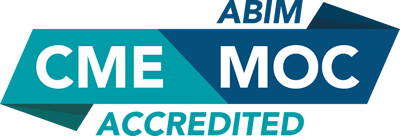
COURSE CREDITS & HOURS
13 AMA PRA Category 1 Credits™13 ACPE Credits
13.0 Contact Hours
Up to 13 (part II) MOC points in medical knowledge in the American Board of Internal Medicine's (ABIM) Maintenance of Certification (MOC) program
2 Hours of Pharmacology for Nurse Practitioners
COURSE FEES
TARGET AUDIENCE
PROGRAM PURPOSE
- Communication Skills Update
- Describe three new communication tools used when interviewing patients
- Describe how tone of voice impacts relationships
- Advanced Communication Skills on Special Topics
- Identify 3 specific complex communication issues that occur in clinical practice
- Motivational Interviewing and the Science of Behavior Change
- Demonstrate communication techniques used in Motivational Interviewing
- Apply a communication tool for Behavior Change
- Neuroscience of Anger and the Angry Patient Encounter
- Describe new concepts in the neuroscience of anger
- Demonstrate the use of 2 communication tools to mitigate anger in oneself and others
- Navigating Difficult Conversations
- Identify early signs of distress in oneself and others
- Apply communication tools to manage conversations when they become difficult
- The impact of obesity as a chronic disease on our health care system.
- Examine the pervasiveness of obesity as a chronic disease, the propensity of interrelated co-morbidities, and the impact on health.
- Mechanisms linking excess adiposity to metabolic dysregulation.
- Describe how excess adiposity is linked to metabolic dysregulation.
- Mood disorders associated with insulin resistance and obesity.
- Assess how selected obesity-related complications, such as mood disorders, eating disorders, and sleep apnea impact management strategies.
- Current and future considerations in pharmacotherapy for obesity and overweight.
- Evaluate new recommendations in the use of current pharmacologic agents and the future development of agents for the treatment of type 2 diabetes, obesity, and overweight.
- The role that genetics plays in the obesity epidemic.
- Distinguish the relationship between genetics and environment in the etiology of obesity.
- The efficacy of bariatric surgery and the management of bariatric patients.
- Describe the efficacy of bariatric surgical procedures on the pathophysiology and management of type 2 diabetes and obesity.
- Lifestyle and behavioral strategies and interventions for the management of diabetes, obesity and overweight.
- Examine the interrelationship between physical exercise, diet, intestinal microbiome and the body immune system that underlie rational management of obesity.
- Medical Cannabis: Clinical Considerations
- Review of the endocannabinoid system and how the medical cannabis system has evolved
- Recognize when medical cannabis is appropriate as a therapeutic option
- How to Authorize Medical Cannabis and Case Studies
- Understand how to authorize/prescribe medical cannabis and apply the knowledge gained to real cases
















 Successful completion of this CME activity, which includes participation in the evaluation component, enables the participant to earn up to 13 (part II) MOC points in medical knowledge in the American Board of Internal Medicine's (ABIM) Maintenance of Certification (MOC) program. Participants will earn MOC points equivalent to the amount of CME credits claimed for the activity. It is the CME activity provider's responsibility to submit participant completion information to ACCME for the purpose of granting ABIM MOC credit.
Successful completion of this CME activity, which includes participation in the evaluation component, enables the participant to earn up to 13 (part II) MOC points in medical knowledge in the American Board of Internal Medicine's (ABIM) Maintenance of Certification (MOC) program. Participants will earn MOC points equivalent to the amount of CME credits claimed for the activity. It is the CME activity provider's responsibility to submit participant completion information to ACCME for the purpose of granting ABIM MOC credit.























